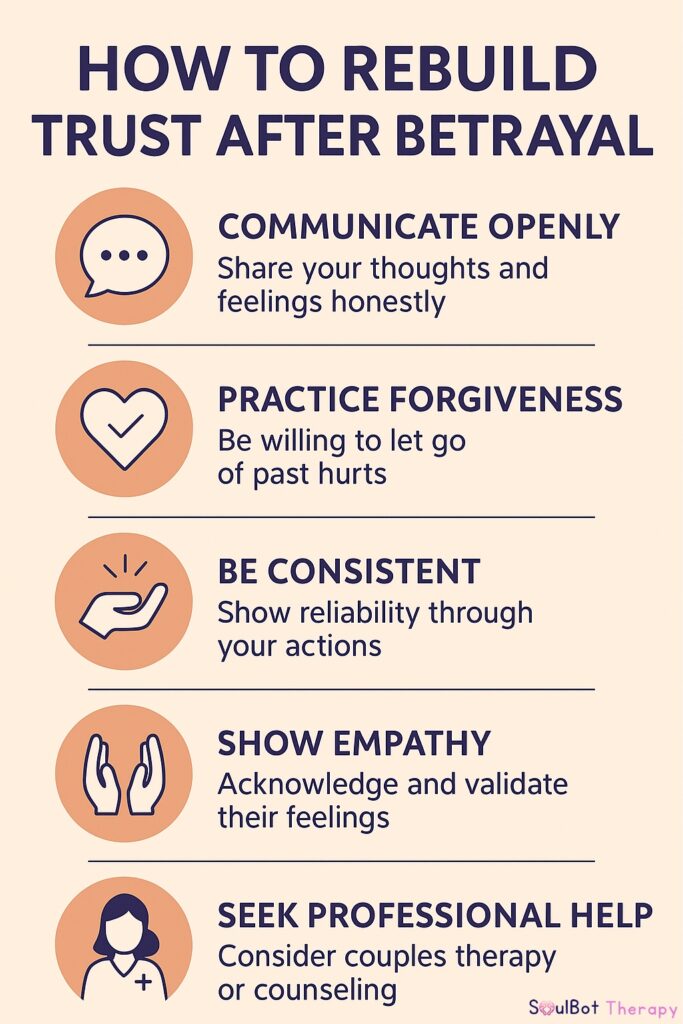Betrayal breaks 💔 more than promises; it fractures our sense of safety, identity, and emotional security. If you’re wondering how to rebuild trust in relationships after heartbreak, infidelity, or lies, you’re not alone.
🧠 Understand the Anatomy of Trust Issues
Trust issues don’t just appear; they’re wired through pain. Whether it’s cheating, emotional manipulation, or broken promises, betrayal rewires the brain’s threat system. You may become hypervigilant, emotionally numb, or closed off.
Typical forms of relationship betrayal include:
- Infidelity or secretive behaviour
- Repeated lying or gaslighting
- Breach of emotional vulnerability or trauma invalidation
- Friendships or family relationships that exploit your trust
These leave deep imprints, often triggering symptoms similar to PTSD: sleep disruption, anxiety spikes, or emotional avoidance.
💔 Why Rebuilding Trust Feels Impossible (But Isn’t)
When trust is broken, your mind tells you to never trust again, a survival response to avoid future pain. But avoiding vulnerability altogether doesn’t lead to peace. Proper mental health recovery involves facing those fears with structure, support, and compassion.
🧠 How to Know If Trust Can (or Should) Be Rebuilt?
Not every relationship deserves a second chance.
Signs it’s worth rebuilding:
- The person shows remorse with changed behaviour, not just words
- You’re both willing to do the work without blame games
- Emotional intimacy is slowly returning
Signs it may be better to walk away:
- Gaslighting, manipulation, or denial continue
- They demand instant forgiveness or “move on.”
- You feel emotionally unsafe or numb
The Reality Check Question
Ask yourself this: “If nothing changed, if they stayed exactly as they are right now, could I be happy with this person for the rest of my life?”
If the answer is no, then the only way forward is through genuine change and growth. And that requires both of you to be committed to the process.
How Long Does It Take to Rebuild Trust?
Rebuilding trust in relationships doesn’t happen in weeks. For some couples, it takes months. For others, years. What matters isn’t speed it’s consistency, accountability, and emotional safety over time.

🔧 Step-by-Step Guide: How to Rebuild Trust in Relationships After Betrayal
Step 1: Validate the Betrayal and Demand Full Disclosure
What this looks like: Acknowledge the pain without minimising or justifying it. You were hurt, and your feelings are valid. Ignoring this delays healing. Address the Root Causes.
Why it matters: Every secret that comes to light later restarts the healing process. It’s like reopening a wound that was starting to heal. Get it all out now, even if it’s painful. If you don’t address the underlying issues, you’re basically putting a band-aid on a broken bone.
How to do it:
- Set aside dedicated time for these conversations
- The betrayer should share without being asked
- Answer every question, no matter how uncomfortable
- Don’t share intimate details about the affair itself (that can be traumatising)
💡Real talk: This step often feels like it makes things worse before they get better. That’s normal. You’re clearing out an infected wound before it can properly heal.
Step 2: Define Boundaries, Not Barriers
What this looks like: Rebuilding trust in relationships doesn’t mean instant forgiveness. It starts with safety. Set emotional and physical boundaries, and give yourself time to decide whether reconciliation is even worth it.
Why it matters: Trust is rebuilt through consistent actions over time. Clear boundaries help both people know what those actions should look like.
Common boundaries might include:
- Complete transparency with phones and social media
- No contact with affair partners or people who enabled the betrayal
- Regular relationship meetings to discuss progress
How to set them:
- Discuss what you both need to feel safe
- Be specific – “be more trustworthy” isn’t helpful
- Make them time-bound; some boundaries are temporary, while trust rebuilds
- Both people should agree to the boundaries willingly
🧠Remember: The person who broke trust doesn't get to decide when they've "earned" trust back. That's up to their partner.
Step 3: Begin Emotional Processing (Individually First)
What this looks like: Journaling, therapy, or tools like SoulBot can help you release anger, confusion, and grief without judgment. This is where AI relationship coaches shine: they guide you through safe self-reflection at your own pace.
Why it matters: You can’t rebuild trust in relationships without honest, effective communication. Plus, many betrayals happen because people don’t know how to address problems directly.
Essential communication skills:
- Active listening: Really hearing your partner, not just waiting for your turn to talk
- “I” statements: “I feel hurt when…” instead of “You always…”
- Time-outs: Agreeing to pause heated conversations before they become destructive
- Regular check-ins: Scheduled times to discuss the relationship and healing progress
- Vulnerability: Sharing your fears, needs, and hopes honestly
💡Pro tip: Consider couples therapy specifically focused on communication skills. A good therapist can teach you tools that will serve your relationship for decades.
👉 Try SoulBot’s Love Language Test to understand what emotional needs matter most to you in rebuilding connection.
Step 4: Rebuild Through Micro-Actions, Not Big Gestures
What this looks like: Trust isn’t rebuilt in speeches; it’s rebuilt in consistency. Look for patterns:
- Do they follow through on small promises?
- Do you feel safe expressing boundaries again?
- Is accountability offered without defensiveness?
Why it matters: Rebuild trust in relationships through patterns of behaviour, not grand gestures. Your partner needs to see that you can be reliable in small things before they’ll trust you with big things again.
Examples of trust-building actions:
- Following through on small promises (I’ll call you at lunch, I’ll pick up groceries)
- Being where you say you’ll be, when you say you’ll be there
- Initiating difficult conversations instead of avoiding them
- Making the relationship a priority in your schedule
- Being patient with your partner’s healing process
For the betrayed partner: Notice and acknowledge positive changes, even small ones. Your partner needs to know their efforts are being seen.
Reality check: This step takes months or years, not weeks. Be patient with the process.Step 5: Create New Positive Experiences (Building Something Better)
What this looks like: Intentionally creating new memories and experiences together while rebuilding intimacy at a pace that feels safe for both people.
Why it matters: You can’t just remove the negative – you need to actively build positive experiences to tip the scales back toward connection and joy.
How to do it:
- Plan regular dates or activities you both enjoy
- Try new experiences together to create fresh memories
- Celebrate small milestones in your healing journey
- Practice gratitude for the positive changes you’re seeing
- Gradually rebuild physical and emotional intimacy
- Create rituals or traditions that feel meaningful
🔐SoulTip: Don't rush this step. Some people try to skip straight to "making new memories" without doing the hard work of steps 1-6. That usually backfires.
Common Challenges and How to Handle Them
🔸 “I thought I was over it, but something triggered me.”
Healing from betrayal often involves processing trauma, and trauma healing isn’t linear. Triggers can occur months or even years later. This doesn’t mean you’re not making progress; it means you’re human.
What to do: Have a plan for dealing with triggers. Practice grounding techniques, reach out for support, and remind yourself that feelings aren’t facts.
🔸 “They’re getting frustrated with my ‘trust issues. ‘
If the person who broke trust is getting impatient with your healing process, that’s a red flag. Genuine remorse includes patience with the consequences of their actions.
What to do: Have an honest conversation about realistic timelines. Consider couples therapy to help them understand the impact of their actions.
🔸 “I keep checking up on them, and I hate myself for it.”
The urge to monitor your partner’s behaviour is a normal response to betrayal. Your nervous system is trying to keep you safe.
What to do: Work with a therapist on trauma recovery techniques. Practice self-compassion. Gradually reduce checking behaviours as trust is rebuilt through their consistent actions.
🧠Fact: Betrayal trauma, especially from romantic partners, can lead to symptoms similar to PTSD, including anxiety, mistrust, and emotional shutdown. According to Healthline, recovery often depends on emotional safety, structured support, and tools like therapy or self-guided interventions.
Source: Healthline – Betrayal Trauma: Signs, Effects, and Recovery
🔸 “We keep having the same fight over and over.”
This usually means there’s an underlying need or fear that isn’t being addressed.
What to do: Try to identify what’s really behind the fight. Are you feeling unheard? Are they feeling overwhelmed? Get to the root of the need.
🤖 How AI Mental Health Support Helps Rebuild Emotional Safety
Tools like SoulBot, your AI mental health assistant, can:
- Track emotional triggers and healing patterns
- Offer daily self-reflection prompts
- Guide you in rebuilding trust without pressure or judgment
- Act as an emotional journal and thought partner when you feel alone
Unlike generic advice columns, AI therapy tools adapt to your journey, whether you want to heal alone, prepare for difficult conversations, or learn how to trust again.
Remember: Healing is possible, growth is possible, and you're stronger than you know. Take this one day at a time. 🌱
🔚 Final Thought: You’re Not Broken, You’re Healing
Trust isn’t something you control; it’s something you rebuild through consistency. You’re not weak for feeling shattered, and you’re not silly for wanting to rebuild trust in the relationship again. Whether you reconcile or walk away, the power is yours.
You don’t owe instant forgiveness. But you do deserve emotional clarity, safety, and peace.
🧠 Need help processing your trust issues and rebuilding trust in relationships? Let SoulBot be your AI relationship coach, safe, private, and designed for real emotional growth.








